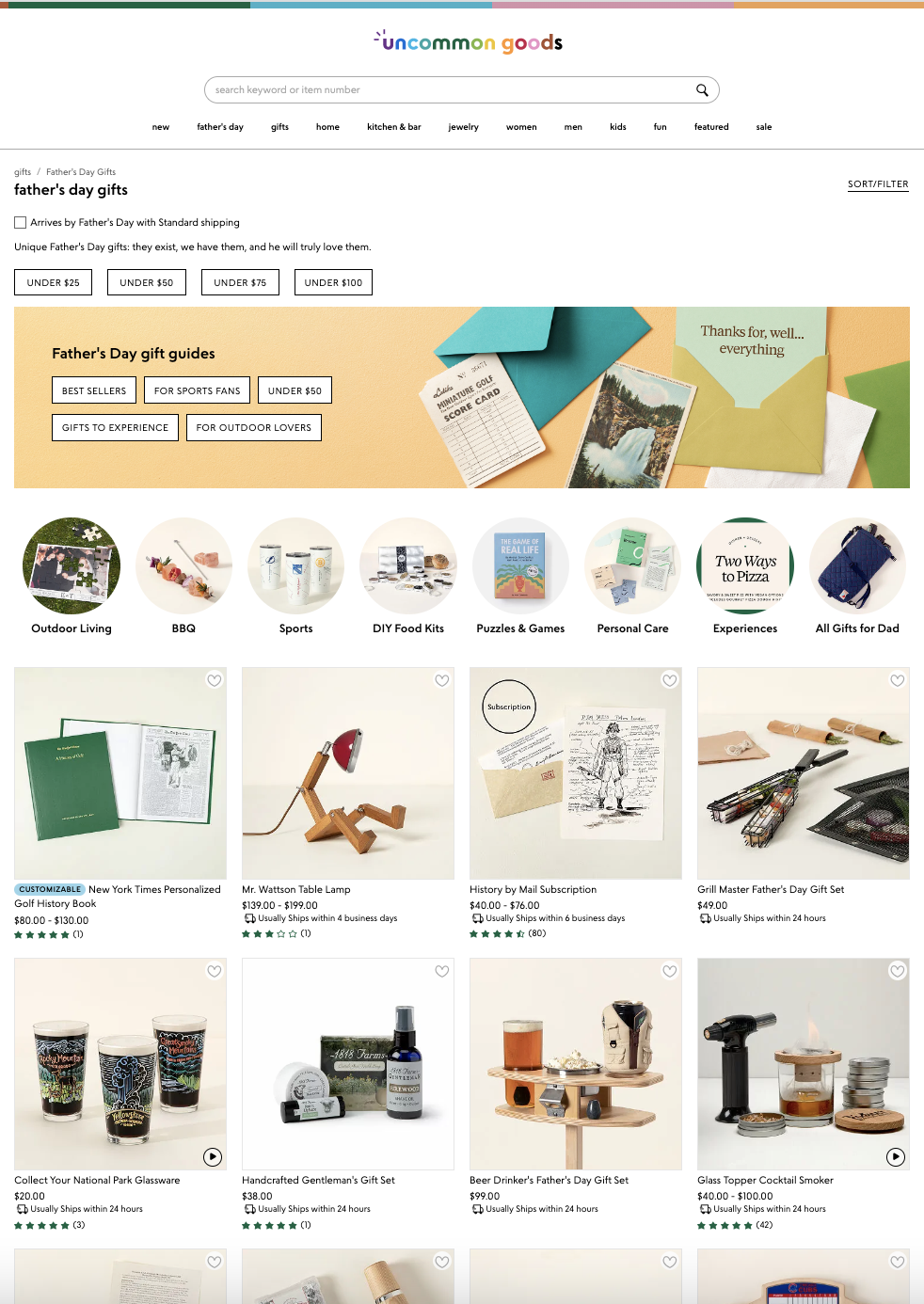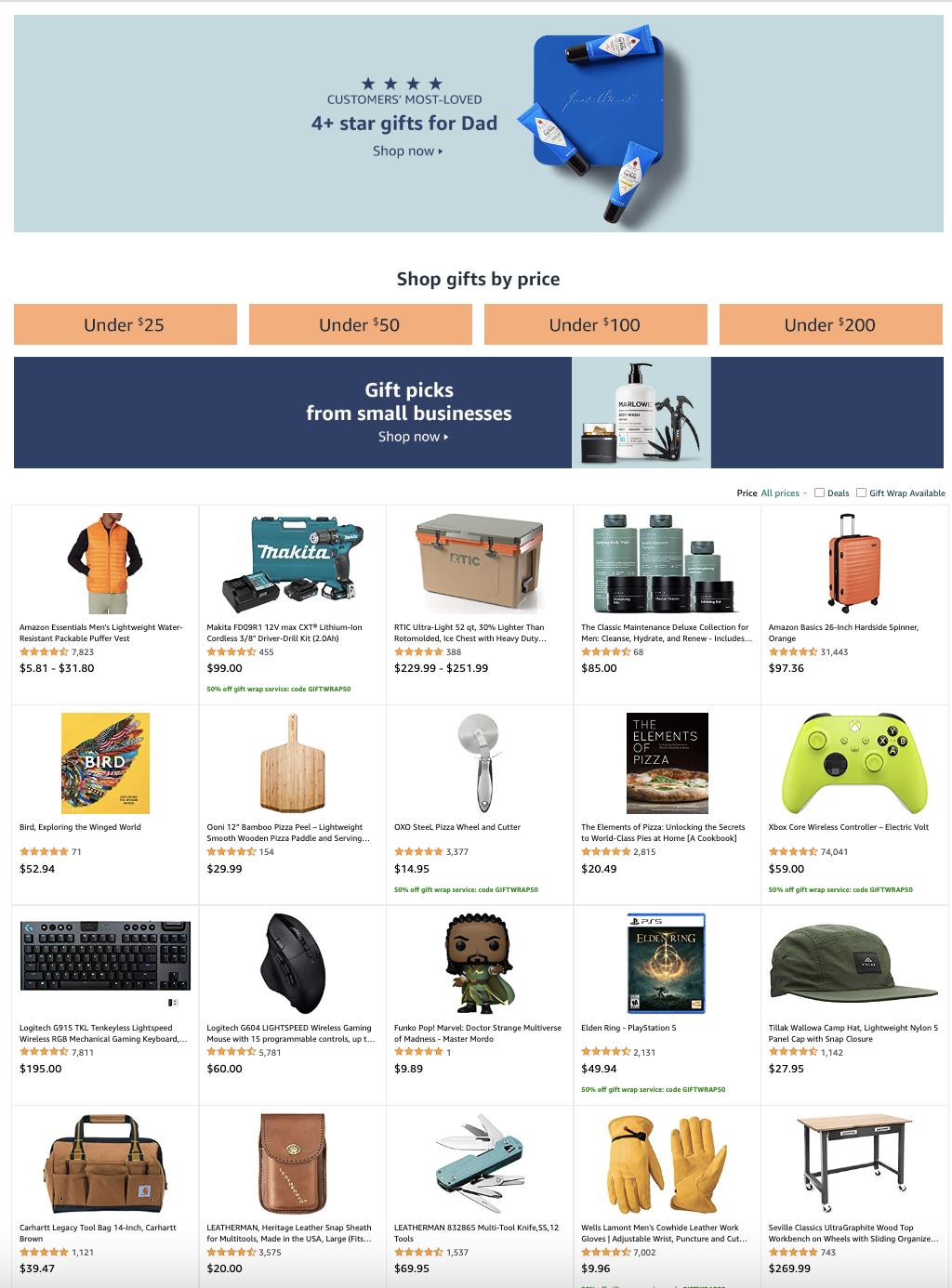By Maryclaire Manard
Father’s day is this coming Sunday, and you may still be looking for that perfect gift. We’ve got you covered.
When consumers are in a pinch, Amazon is often the go-to quick fix. But if you’re even reading this in the first place, it’s likely because you’re the type of consumer who would prefer buying products from companies that operate more responsibly with impacts on people and planet in mind. In that case, Amazon is probably not the solution for you.
So we’ll let you in on a secret: You can find cost-comparable, timely shipped, and almost identical gifts this Father’s Day at our #1 Amazon alternative – Uncommon Goods.
(oh, and if that isn’t exciting enough, we’re also donating $1 to Big Brothers Big Sisters of America for every purchase made on Uncommon Goods through the links in this post from now through Father’s Day.)

Screenshots of Uncommon Goods’ and Amazon’s Father’s Day sites
But first, why avoid Amazon?
Amazon scores a D on Cluey for impacts on both people (workers, customers, suppliers, and communities) and the planet (emissions, waste, resource use, and impacts on habitats and ecosystems). Let’s break it down a bit further:
Amazon’s risks and controversies range the gamut on social and environmental impacts. Just last year, for example, undercover footage revealed Amazon fulfillment centers destroying millions of perfectly good, unsold products because it’s more cost-effective to dispose rather than to continue storing. Without question though, Amazon’s significant controversies around impacts on its workers and customers are the most egregious. From human rights violations, to unsafe working conditions resulting in multiple worker injuries and deaths, consistently being ranked as one of the most dangerous employers in the U.S., to not protecting customer data and privacy, and consumer safety as well as engaging in anti-competitive practices. The ugly headlines in this category are too numerous to list.
We get it, Amazon makes it so darn easy to give them money. And for what it’s worth, they do have programs in place aimed at bettering their impact, from the charitable give-back program, AmazonSmile, to their various environmental commitments. There is zero judgment for continuing to shop on Amazon. We simply want to highlight an awesome alternative that’s pretty close to the same experience, but with ten times less eco and ethical guilt.
So What is Uncommon Goods?
Uncommon Goods is the ethical and sustainable marketplace for goods and experiences offered by independent businesses and artists. They specialize in unique gifts for everyone that encompass at least one element of their purpose, and they combine the convenience and selection of Amazon with the consciousness of a B-Corp certified brand.
What makes them comparable to Amazon?
1. Price – Similar to Amazon, Uncommon Goods ranks their gifts by “under $25, $50, $100,” etc.
2. Optionality – Like Amazon, Uncommon Goods has thousands of options on its site, and 531 curated “gifts for dad” that range across interests categories (sports lovers, grill masters, etc). Even better than Amazon, is the fact that Uncommon Goods also lets you gift experiences (game changer!), and has a selection of customizable gifts (similar to Etsy). In some cases, they even offer the same or similar products as Amazon. Here are just 8 examples: Dad Jokes, National Parks Puzzle, Beard Care Set, Grill Masters Gift Set, Make Your Own Hot Sauce Kit, Baseball Park Glasses, Cold Brew Coffee Maker & Carafe, Video Conference Mute Button
3. Speed & Convenience – Time is of the essence with any last-minute purchase, and a large portion of the selection on Uncommon Goods site states that the product “Usually ships within 24 hours.” Important: Uncommon Goods’ site states for customers looking to do regular shipping to get their gifts in time for Father’s Day, to order by 5pm ET on Monday June 13th. And if you’re sold on Uncommon Goods as your go-to for future gift giving, you can sign up for their annual membership, similar to Prime, to unlock special perks like free shipping and bonus charitable donations with your purchases.
What makes them a better alternative for people and the planet?
Certifiably Good – Unlike Amazon, Uncommon Goods scores a B+ on Cluey for impacts on people and the planet. As mentioned, Uncommon Goods is also B-Corp certified, an annual certification which means they adhere to some of the highest operating standards available today for balancing profit with social and environmental impacts. In 2018 they were also named a Forbes Small Giant, an annual list celebrating 25 standout businesses that favor greatness over growth.
People First – In addition to helping hundreds of independent artists get their work discovered, Uncommon Goods puts a premium on how they treat their workers, from offering double the federal minimum wage as starting pay to hourly workers, to providing fair paid family leave, and advocating for it outside their organization as well.
Environmentally Conscious – Where possible, Uncommon Goods uses and encourages their artists to use recycled and sustainable materials, including for packaging. Additionally, they print their catalog on Forest Stewardship Council paper, and they never include leather, feathers, or fur in their products.
Giving Back – Through their Better to Give program, Uncommon Goods donates $1 for every purchase to a charity partner of your choice, and they’ve donated over $2 million since launching the program. And to sweeten the swap from Amazon even more, we’re donating $1 to Big Brothers Big Sisters of America for every purchase made on Uncommon Goods through the links in this post from now through Father’s Day.
Wow, this is great! Are there any other alternatives to Amazon?
There most certainly are! Many mainstream retailers and more targeting gift sites are hoping to compete with the 800-lb gorilla that is Amazon, and for some of those companies, they know that operating in a more sustainable and ethical way can certainly attract more conscious consumers (win for consumer demand creating positive change! woo!) A few of other companies to check out include:
(1) Etsy – The online marketplace provides sellers who are making mostly customized goods access to customers around the world, giving many a new type of economic opportunity. To combat customer concerns around quality, Etsy recently announced they will be launching a purchase protection plan in August. However, Etsy has also recently come under fire from its independent sellers for hiking their fees, and for not doing enough to crack down on resellers who are reselling mass-produced goods that they haven’t taken any part in creating themselves. They score a C- for people impacts and an A for planet impacts on Cluey.
(2) DoneGood – DoneGood is a marketplace that curates goods from multiple best-in-class brands who put a premium on ethical and sustainable operations. They’re also incorporated as a public benefit corporation, which means they are obligated to uphold certain standards in how they run their business that puts a higher premium on impacts on people and the planet. Although these are all major wins, there is not yet enough data for Cluey to provide a rating for DoneGood.
(3) Society6 – Another marketplace, but this one specializes in selling independent artists’ designs on items like coffee mugs, throw pillows, and hanging wall prints. Given this site is limited to a particular selection of goods that have designs printed on them, it may fall short of your needs for a gift for Dad. Additionally, at this time, there is not enough data for Cluey to provide a rating for Society6.
It’s important to remember, all purchases have an impact.
Impacts can go either way, in some cases they can be seen as positive because they provide economic opportunity and support a small business or local artisan. In other cases, they have a less positive impact because every product comes with an environmental footprint (how is it made, shipped, and disposed of). It’s important to remember that there will never be a perfect consumption option, but there are often better options. And if you’re trying to avoid stuff altogether, check out this post on 33 gift ideas that aren’t stuff.
Last question, is Cluey making money from this?
At Cluey, transparency is core to our mission, so we want to be extremely clear that yes, we make a small commission on any purchases made with Uncommon Goods from this post. If you want to learn more about how we make money, and why we stand by our recommendations, read about it here.
Maryclaire is the CEO and Founder of Cluey Consumer. She started Cluey out of her personal frustration with the inconvenience and difficulty of aligning consumer behavior with personal political, social, and environmental values.

